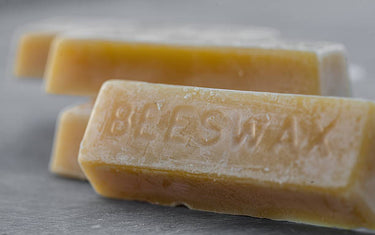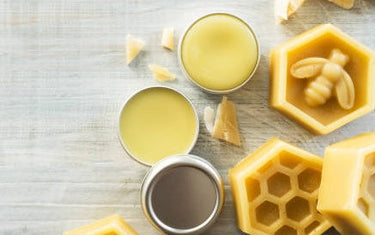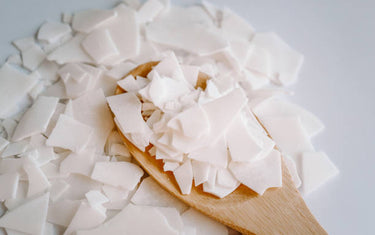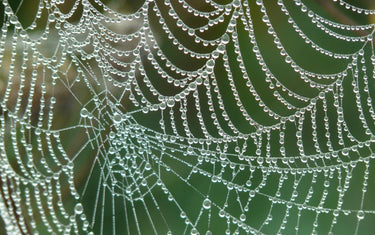5 min read / 10 September 2024 / yasmin sharp
Pet Safe Spider Repellent Essential Oils
Learn how to safely use essential oils as spider repellents without harming your pets.
Share this post
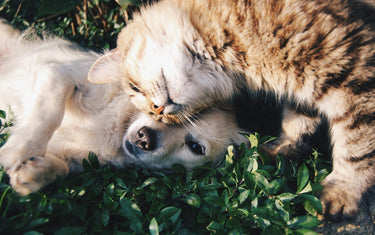
Using essential oils to get rid of spiders from your home can be very effective, but if you have a cat, dog or any other kind of furry friend, how do you make them pet safe?
While there are a lot of easy-to-make home remedies available, there can be some uncertainty about what is and isn’t safe to use.
We’ve put together a short guide that will give you some ideas about what to use around your home without harming your pets.

Pet safe spider repellent essential oils
If you need a natural spider repellent that is also pet-friendly, you could try:
1. Cedarwood oil
Cedarwood oil is generally considered safe to use around both cats and dogs. Its effectiveness as a spider repellent is still up for debate, although there is a fair amount of anecdotal evidence that suggests it could be effective.
If you don’t want to use an oil-based spider spray for fear of affecting your pets, you can also use cedarwood blocks to deter spiders.
On a slightly different note, studies have found that cedarwood essential oil can keep moths at bay, which can prove very useful if they tend to invade your home at night. [1]
2. Lavender oil
This is safer for dogs than it is for cats, so you may want to use another method if you are worried about causing any harm.
Whilst research on the effectiveness of lavender essential oil as a spider repellent is limited, as is the case with cedarwood oil, lots of people claim it keeps the eight-legged pests away.
One study did find that lavender oil was able to reduce the survival rate of a two-spotted spider mite, and while further tests are needed, it does suggest that it could be a useful anti-spider repellent. [2]
3. Tea tree oil
An all-round effective insect repellent is tea tree oil, which is able to frighten off all kinds of unwanted bugs and pests.
Researchers have discovered that it works well as a natural spider repellent, which is mostly due to its potent herbaceous scent. [3]
However, when it comes to pets it can be a little more complicated. There are lots of pet products that list tea tree oil in their ingredients, although concentration levels tend to be very low.
When exposed to high concentration levels, tea tree oil can be highly toxic for both cats and dogs, so depending on how you intend to use the oil to repel spiders, this is something worth taking into consideration. [5]
4. Peppermint oil
If you search for “Is peppermint oil toxic for pets?” online, you’ll find a long list of conflicting answers. Where some websites will say it is safe, others will state the opposite.
Menthol is the core ingredient of peppermint oil which can be dangerous for both humans and animals if consumed in large amounts. [4]
The safest stance to take as a pet owner is to avoid using peppermint oil for spiders, as the last thing you want to do is to put your little friend at risk.

Pet safe spider prevention techniques
If you are making a pet safe natural spider repellent for your home, you could try:
A homemade spider spray
- Mix 7-10 drops of your preferred essential oil (avoid using peppermint oil for spiders if you have a pet) with 500ml of water.
- Add one squirt of dish soap.
- Replace the bottle lid and shake well.
- Remove your pet from the spray area and spritz in corners, window sills and door frames. Only let your pet back into the room when the oil has fully dried.
- Repeat this process as often as needed to keep spiders at bay.
Using a diffuser
This is the safest way to use essential oils around your pets, although there are still some precautions you should take.
You can use passive diffusers (reed diffusers, for example) as long as you keep them out of reach. If you own an active diffuser, such as an electric diffuser, ensure the space is well-ventilated when in use.
However, if your pet has allergies, serious health concerns or has been diagnosed with a respiratory condition, you should not use essential oils in any form when they are around.
Making a vinegar solution
If you are worried about using essential oils around your pets, you could try your hand at making a vinegar solution, which can act as a pet safe spider repellent.
- Fill a spray bottle with equal parts white vinegar and water.
- Replace the lid and shake well.
- Spritz in doorways, windowsills, corners and anywhere that is likely to house spiders in your home.
- Repeat as needed.
Essential oil safety tips for pets
If you are making essential oil home remedies to repel spiders, they should also be used with care around your pets. You can use the following safety tips for cats, dogs and other small pets:
- If you are a bird owner, it is probably a better idea to use an alternative spider repellent for your home.
- Be cautious about using essential oils around pets that are young, nursing or pregnant.
- When spraying essential oils around window sills, skirting boards and doorways, keep your pet elsewhere in your home and allow the oil to soak in to minimise any risks.
- Keep a close eye on your pet’s behaviour when you are using essential oils around them.
- Always dilute essential oils when making a spider spray or if using them for any other purpose, as they can be toxic to pets.
- If you notice any signs of drooling, shaking, distress, diarrhoea, vomiting, drooling or any other signs of distress, discontinue use of the oil.
- Store your essential oils out of reach of your pet so their curious paws do not inadvertently put themselves at risk.

Final thoughts
Using essential oil home remedies as a spider repellent without harming your pets is possible, although it does mean you will have to take extra precautions.
Diffusion is probably the safest option, but it may not be as effective as spritzing a spider spray, so always make sure you have good ventilation, and your pets are out of harm’s way.
Also have a read through of our safety tips above to give you an idea of the dos and don’ts of making a pet safe spider repellent.
[1] Abha Chaudhary et al. (2011) Chemical Composition and Larvicidal Activities of the Himalayan Cedar, Cedrus deodara Essential Oil and Its Fractions Against the Diamondback Moth, Plutella xylostella https://www.ncbi.nlm.nih.gov/pmc/articles/PMC3281365/
[2] Rafael Laborda et al. (2018) Spike lavender essential oil reduces the survival rate and fecundity of two-spotted spider mite, tetranychus urticae (Acari: Tetranychidae) https://www.researchgate.net/publication/327838524_Spike_lavender_essential_oil_reduces_the_survival_rate_and_fecundity_of_two-spotted_spider_mite_tetranychus_urticae_Acari_Tetranychidae
[3] Yunho Yang et al. (2020) Insecticidal Activity of 28 Essential Oils and a Commercial Product Containing Cinnamomum cassia Bark Essential Oil against Sitophilus zeamais Motschulsky https://www.ncbi.nlm.nih.gov/pmc/articles/PMC7469181/
[4] Akshay Kumar et al. (2016) A fatal case of menthol poisoning https://www.ncbi.nlm.nih.gov/pmc/articles/PMC4830155/
[5] Tea Tree Oil - PET POISON CONTROL https://vetmeds.org/pet-poison-control-list/tea-tree-oil/#!form/PPCDonations




